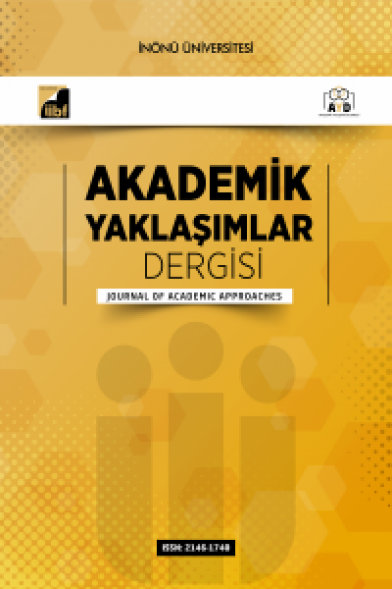EMOTIONAL INTELLIGENCE FOR LEADERSHIP (UTILIZING LEADERSHIP CHARACTERISTICS FOR LEADERS WITH EMOTIONAL INTELLIGENCE): A CASE STUDY IN TURKISH MILITARY
Bu çalışmanın amacı, Türk Kara Kuvvetlerinde görevli subayların
duygusal zeka ve liderlik becerileri arasındaki ilişkinin incelenmesi ve bu
ilişkide yaş ile eğitim durumunun duygusal zekanın gelişimi üzerinde bir
etkisinin olup olmadığının belirlenmesidir. Duygusal zekanın liderlik
üzerindeki etkisi, Bar-On Duygusal Zeka Ölçeğinin 213 subay üzerinde
uygulanması ile ölçülmeye çalışılmıştır. Subayların rütbeleri (yaş faktörü) ve
askeri kökenleri (eğitim geçmişi) temel çıkış noktası olarak ele alınmıştır.
Araştırma sonucunda rütbe değişkeni ile toplam duygusal zeka
arasında olumlu yönde bir ilişki bulgulanmıştır: Rütbe arttıkça, toplam duygusal zeka becerilerinin arttığı gözlemlenmiştir. Benzer biçimde, kara
harp okulu mezunu subayların duygusal zeka düzeylerinin diğer
kaynaklardan gelen subayların gerisinde olduğu sonucuna ulaşılmıştır.
Anahtar Kelimeler:
Duygusal zeka, Liderlik, Liderlik için Duygusal Zeka
EMOTIONAL INTELLIGENCE FOR LEADERSHIP (UTILIZING LEADERSHIP CHARACTERISTICS FOR LEADERS WITH EMOTIONAL INTELLIGENCE): A CASE STUDY IN TURKISH MILITARY
This study aims to determine the relationship between emotional intelligence (EI) and leadership skills and to inspect the influence of age and educational background factors on emotional intelligence development of the officers within Turkish Land Forces. The impact of emotional intelligence on leadership is studied through Bar-On Emotional Intelligence Survey, on 213 ranked officers. The subjects are categorized according to their ranks (as a substitute for age factor) and military origin (as a substitute for educational background). The survey results propose a positive relationship between military rank and total EI: The higher the military rank, the superior the level of total EI. Similarly, military origin is observed to have impact on emotional intelligence, as military academy graduates demonstrated lower levels of total emotional intelligence compared to officers with other origins.
___
- Abrahams, D. S. (2007). Emotional intelligence and army leadership: Give it to me straight . Military Review, 3-4, 90.
- Acar, T. F. (2001). Duygusal zeka yeteneklerinin goreve yonelik ve insana yonelik liderlik davranislari ile iliskisi: Banka sube mudurleri uzerine bir alan arastirmasi (Unpublished doctoral dissertation). Istanbul Universitesi, Istanbul.
- Arikan, M. (2001). Askeri liderlik yardimci kitabi. Ankara: Kara Harp Okulu.
- Atkinson, R. L. (1995). Psikolojiye giris. Istanbul: Sosyal Yayinlar.
- Berberoglu M. S., & Demiray C. (2002). Askeri liderlik ders kitabi. Ankara: KHO Matbaasi.
- Cacioppe, R. (1997). Leadership moment by moment . Leadership and Organization Development Journal. 18 (7), 337.
- Certo, S. C. (1989). Principles of modern management: Functions and systems. Boston: Allyn & Bacon.
- Dulewicz V. & Higgs M. (2004). Can emotional intelligence be developed?. International Journal of Human Resource Mangement, 15 (1), 96.
- Fred, A., & Manske, J. R. (1994). Etkili liderligin sirlari. Ankara: T.C. KKK. Kara Harp Okul Komutanligi.
- Goleman, D. (1995). Emotional intelligence: Why it can matter than IQ. London: Bloomsburry.
- Goleman, D. (2001). Working with emotional intelligence. Westminster: Bantam Books.
- Hellriegel, D. & Slocum, J.W. (2006). Organizational behavior. Mason, OH: South- Western College Publishers.
- Jackson, M., & Lash, R. (1999). Enhancing your leader’s emotional intelligence. Canadian HR Reporter, 21 (12).
- Ratnesar R. (1997). Teaching feelings 101, Time, 150 (9), 150.
- Salovey, P., & Mayer, J. (1990). Emotional intelligence. Imagination, Cognition, and Personality, 9, 185-211.
- Schachter, D. (2009). Developing and applying emotional intelligence. Information Outlook, 13(5), 50.
- Sewell, G. F. (2009). Emotional intelligence and the army leadership requirements model. Military Review, 11-12, 95-98.
- Topuz, H. (2005). The relationship between leadership and emotional intelligence: A proposed development model for enhancing leadership qualities among the officers in the Turkish Navy. (Unpublished master dissertation). Turkish Naval Academy, Istanbul.
- Yayın Aralığı: Yılda 2 Sayı
- Başlangıç: 2010
- Yayıncı: Gökhan Tuncel
Sayıdaki Diğer Makaleler
BİLİMSEL ARAŞTIRMALARDA PROBLEMATİK: PROJELENDİRME VE RAPORLAŞTIRMA
KÜRESELLEŞME SÜRECİNDE SERMAYE HAREKETLERİNİN VERGİLENDİRİLMESİ: TOBİN VERGİSİ
BELEDİYELERDE HALKLA İLİŞKİLER YÖNETİMİ: İZMİR İLİ BELEDİYELERİNE YÖNELİK BİR ARAŞTIRMA
Nilay Başok YURDAKUL, Müjde Ker DİNÇER, Gül COŞKUN
TÜRKİYE’DE İŞ KAZALARININ MALİYETLERİ VE ÇÖZÜM ÖNERİLERİ
TÜRKİYE EKONOMİSİNİN YAPISAL ANALİZİ: 1998 VE 2002 YILLARI GİRDİ-ÇIKTI ANALİZİ ÖRNEĞİ
Ziya Gökalp GÖKTOLGA, Yusuf AKGÜL
KÜRESEL REKABETİN İŞLETMELERİN ÜRETİM VE İSTİHDAM YAPISI ÜZERİNDEKİ ETKİLERİ
